人教版英语必修二Unit 2(Reading:An Interview)教案
Unit2 Reading An Interview
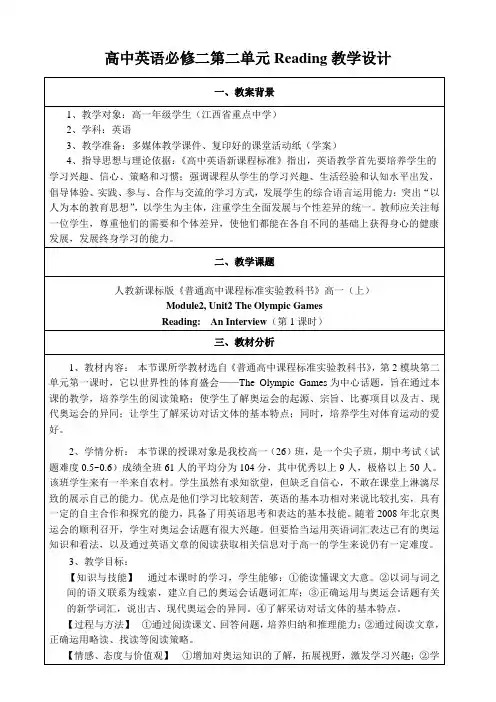
高中英语必修二第二单元Reading教学设计一、教案背景1、教学对象:高一年级学生(江西省重点中学)2、学科:英语3、教学准备:多媒体教学课件、复印好的课堂活动纸(学案)4、指导思想与理论依据:《高中英语新课程标准》指出,英语教学首先要培养学生的学习兴趣、信心、策略和习惯;强调课程从学生的学习兴趣、生活经验和认知水平出发,倡导体验、实践、参与、合作与交流的学习方式,发展学生的综合语言运用能力;突出“以人为本的教育思想”,以学生为主体,注重学生全面发展与个性差异的统一。
教师应关注每一位学生,尊重他们的需要和个体差异,使他们都能在各自不同的基础上获得身心的健康发展,发展终身学习的能力。
二、教学课题人教新课标版《普通高中课程标准实验教科书》高一(上)Module2, Unit2 The Olympic GamesReading: An Interview(第1课时)三、教材分析1、教材内容:本节课所学教材选自《普通高中课程标准实验教科书》,第2模块第二单元第一课时,它以世界性的体育盛会——The Olympic Games为中心话题,旨在通过本课的教学,培养学生的阅读策略;使学生了解奥运会的起源、宗旨、比赛项目以及古、现代奥运会的异同;让学生了解采访对话文体的基本特点;同时,培养学生对体育运动的爱好。
2、学情分析:本节课的授课对象是我校高一(26)班,是一个尖子班,期中考试(试题难度0.5~0.6)成绩全班61人的平均分为104分,其中优秀以上9人,极格以上50人。
该班学生来有一半来自农村。
学生虽然有求知欲望,但缺乏自信心,不敢在课堂上淋漓尽致的展示自己的能力。
优点是他们学习比较刻苦,英语的基本功相对来说比较扎实,具有一定的自主合作和探究的能力,具备了用英语思考和表达的基本技能。
随着2008年北京奥运会的顺利召开,学生对奥运会话题有很大兴趣。
但要恰当运用英语词汇表达已有的奥运知识和看法,以及通过英语文章的阅读获取相关信息对于高一的学生来说仍有一定难度。
高中英语-Unit-2-The-Olympic-Games-Reading-An-interview-教学设计-新人教版必修2
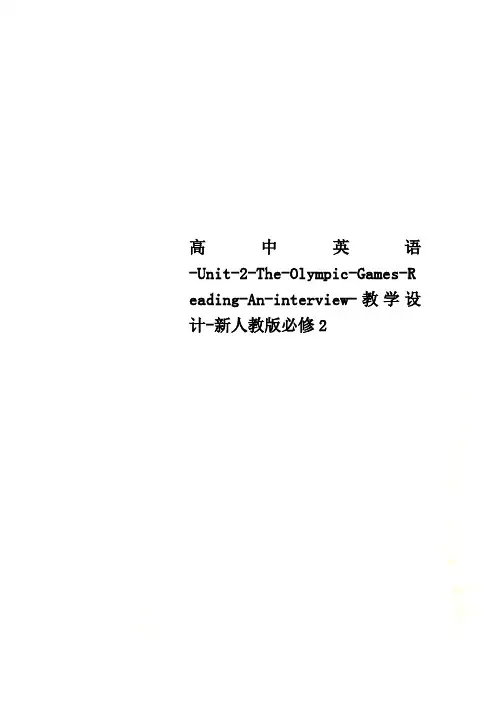
高中英语-Unit-2-The-Olympic-Games-R eading-An-interview-教学设计-新人教版必修2Unit 2 The Olympic Games一、教学对象分析本校学生英语水平整体较高,可是学生个性和知识水平差异大。
奥运会这个话题并不陌生,但学生对古代奥运会和现代奥运会的异同点并不是很清楚。
这篇文章以采访的形式向学生讲述这些知识,教师设计了一些课堂活动,以帮助学生获取信息,进一步激发学生的兴趣,提高课堂的积极性,逐步实现各项教学目标。
二、教材内容分析本案例是人教版《普通高中课程标准试验教科书·英语(必修)2》,第二单元阅读部分,本篇课文的标题是An Interview。
课文是一个虚拟的采访——两千多年前古希腊作家帕萨尼亚斯与一位北京奥运会志愿者李艳的对话,向学生介绍了古代和现代奥运会的异同以现代奥运会的一些基本情况。
随着问题的逐步展开,学生对奥运会的了解也越来越全面。
文章的这种设计给学生创设了语言情境,把描述竞技体育这一话题的语言内容变成了生动有趣的对话,让学生有一种身临其境的真实感受。
三、教学目标(1)帮助学生掌握重点单词和短语的用法,如ancient, volunteer, regular, take part in, every four years, be admitted as 等。
进一步帮助学生理解课文中的难句。
(2)帮助学生在阅读的过程中,运用略读,寻读,细读的阅读技巧,提高学生用英语获取信息,处理信息,分析和解决信息的能力。
(3)通过阅读使学生熟悉奥运会,能用英语就奥运会的知识进行互问互答,并能阐述古代奥运会和现代奥运会的异同及现代奥运会的一些情况。
四、教学过程Step 1 Warming-up and lead-in (8mins) (1)视频热身 (4mins)教师通过播放北京申奥成功的视频,引出奥运会的话题。
T: Just now we enjoy a short video. What is it mainly about?S: People were very excited because our China succeeded in getting the right to host the 28th Olympic Games.T: Now Beijing has hosted the Olympic Games successfully. So you know more about the Olympics.S: Yes.(2) 奥运知识小测导入 (4mins)T: So I’d like to give you a quiz to see how much you know about the Olympics. Are you ready?①W here did the ancient Olympic Games start?( It was in Greece)…..[意图说明]教师用北京申奥成功视频导入,具有形象,生动的特点,能吸引学生的注意力。
高中英语人教版必修二Unit2-Reading An Interview
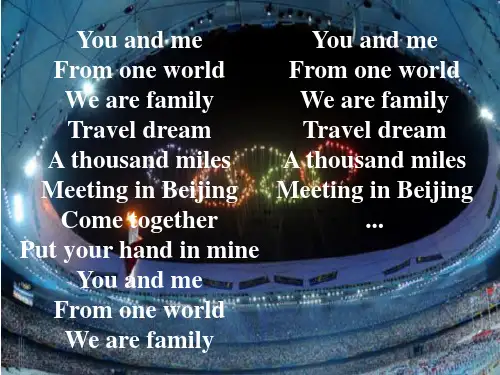
Careful reading
Read the passage carafully and find out the similarities and differences between ancient and modern Olympics.
Competitors
__M__en__ are allowed to take part in both ancient ifferences
Name
The ancient
Olympics
Host country Only Greece
The modern Olympics
Countries from all over the world
Competitors Only men
Men and women
Main sets of Only the Summer The Summer Olympics
Games
Olympics
& the Winter Olympics
Prizes
Speaking
(Do An Interview)
Suppose you are Interviewer(采访者) Now you are interviewing your classmates and you ask them some quetions what you have learnt in this class.
Careful reading
The similarities
How often What for
Both are held __________________
人教课标版高中英语必修2 Unit2_Reading名师教学设计
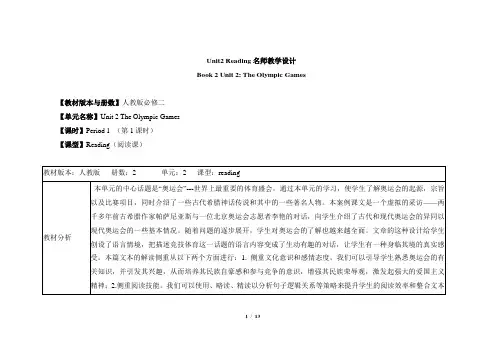
3.T:askstheclasstoreadcarefullytofindthesimilaritiesanddifferencesoftheancientandmodernOlympicGames.
S:readandfillintheform
4.T:asksthechangesofPausanias’feelingsbasedonsomesentences.
1.P:WinterGames?Howcantherunnersenjoycompetinginwinter?Andwhataboutthehorses?(line17-line18)
2.P:Pleasewaitaminute!Allthoseevents,allthosecountriesandevenwomentakingpart!(line32-line33)
(3)谈论对于主办城市来说举办奥运会的利弊
3.情感态度目标:
(1)通过文本的理解,从古今奥运会的异同上体会出社会文明的进步
(2)从奥运会运动精神中,体会“更高,更快,更强”的运动精神,并把它融入到学习和生活中。
(3)进一步增强爱国主义精神和民族自豪感,同时充满要把英语学好的热情
4.思维目标
通过阅读让学生了解阅读过程中有很多阅读策略可以借鉴,如从关键词中看出主要话题、从关键细节推断情感变化、通过制作表格或思维导图等手段使信息能够逻辑化的分类。
DELC7
4
评价学生学习
Step4
summary(8mins)
1.T:liststheexpressionsfortheclasstocheck
S:checkwhethertheyhavemasteredtheexpressions
必修二Unit2-An-Interview reading教案
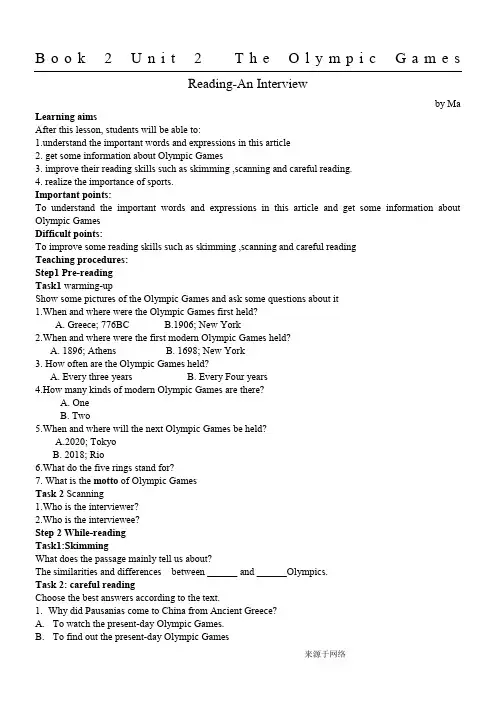
B o o k2U n i t2T h e O l y m p i c G a m e sReading-An Interviewby Ma Learning aimsAfter this lesson, students will be able to:1.understand the important words and expressions in this article2. get some information about Olympic Games3. improve their reading skills such as skimming ,scanning and careful reading.4. realize the importance of sports.Task1Task 22.Who is the interviewee?Step 2 While-readingTask1:SkimmingWhat does the passage mainly tell us about?The similarities and differences between ______ and ______Olympics.Task 2: careful readingChoose the best answers according to the text.1.Why did Pausanias come to China from Ancient Greece?A.To watch the present-day Olympic Games.B.To find out the present-day Olympic Games来源于网络C.To take part in the present-day Olympic GamesD.To work as a volunteer for the 2008 Olympic Games2.Which of the following can’t be included in the Summer Olympic Games?A.Running racesB. SwimmingC. SailingD. Skiing3.Why do so many countries compete for hosting the Olympic Games?A.Because it can bring in lots of money to the host country.B.Because it can make the host country win more medals.C.Because it’s a great responsibility and a great honour.D.Because it can make the host country stronger.4.Which word can best describe Pausanias’ feeling?来源于网络。
高中英语必修二第二单元教案人教版
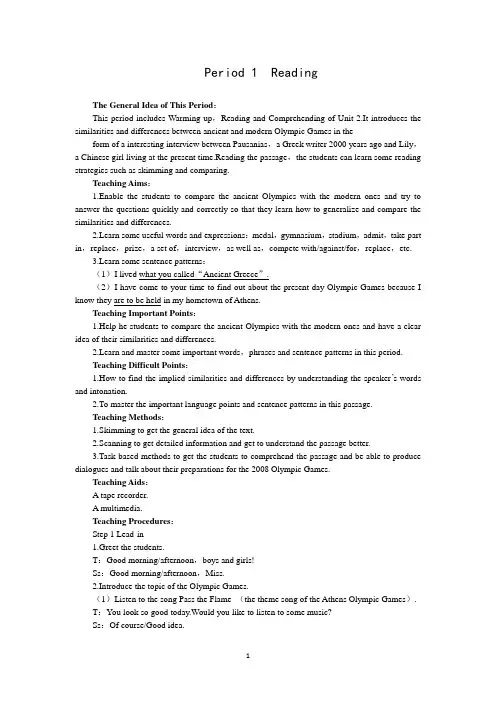
Period 1 ReadingThe General Idea of This Period:This period includes Warming up,Reading and Comprehending of Unit 2.It introduces the similarities and differences between ancient and modern Olympic Games in the form of a interesting interview between Pausanias,a Greek writer 2000 years ago and Lily,a Chinese girl living at the present time.Reading the passage,the students can learn some reading strategies such as skimming and comparing.Teaching Aims:1.Enable the students to compare the ancient Olympics with the modern ones and try to answer the questions quickly and correctly so that they learn how to generalize and compare the similarities and differences.2.Learn some useful words and expressions:medal,gymnasium,stadium,admit,take part in,replace,prize,a set of,interview,as well as,compete with/against/for,replace,etc.3.Learn some sentence patterns:(1)I lived what you called“Ancient Greece”.(2)I have come to your time to find out about the present day Olympic Games because I know they are to be held in my hometown of Athens.Teaching Important Points:1.Help he students to compare the ancient Olympics with the modern ones and have a clear idea of their similarities and differences.2.Learn and master some important words,phrases and sentence patterns in this period.Teaching Difficult Points:1.How to find the implied similarities and differences by understanding the speaker’s words and intonation.2.To master the important language points and sentence patterns in this passage.Teaching Methods:1.Skimming to get the general idea of the text.2.Scanning to get detailed information and get to understand the passage better.3.Task-based methods to get the students to comprehend the passage and be able to produce dialogues and talk about their preparations for the 2008 Olympic Games.Teaching Aids:A tape recorder.A multimedia.Teaching Procedures:Step 1 Lead-in1.Greet the students.T:Good morning/afternoon,boys and girls!Ss:Good morning/afternoon,Miss.2.Introduce the topic of the Olympic Games.(1)Listen to the song Pass the Flame (the theme song of the Athens Olympic Games).T:You look so good today.Would you like to listen to some music?Ss:Of course/Good idea.T:(P lay the song)Have you ever heard of the song?Ss:Yes/Sure.T:What is the name of it?Ss:Pass the Flame.T:What else do you know about the song?S1:It’s the theme song sung in the 2004 Athens Olympic Games.S2:科兹拉斯sings it.S3:It calls on people to get united together.(2)Sharing information about the Olympic Games.T:Good.I can see you have a good idea about what is happening around us.Talking about the Olympic Games,I have asked you to find as much information as possible on the history,the motto,the event and the previous Olympic Games,right?Have you done that?Ss:Yes.T:So who would like to share the information with us?S4:Let me have a try.I would like to talk about the events in the Olympic Games.(Introduces the events of badminton,table tennis,hurdles,diving,skiing,skating,volleyball,basketball,volleyball,gymnasium,high jump,weighting lifting and boxing,etc.At the same time,show the information and pictures on the screen.)S5:I want to share some pictures I got on the Internet too.(Also shows what he got on the screen.)Look at the first picture.What is it?Ss:A big stadium.S5:What about this one?Ss:Erh...S5:It’s an Olympic torch.Let’s have a look at this one.What can you see?Ss:A flag.S5:Yes,it is the Olympic flag.There are five rings joined together.Can you guess what the five rings are?(Tells the Ss that they are the five continents.They are joined together as a sign of friendship—the blue one represents the Europe,the yellow one refers to Asia,the black one stands for Africa,the green one is a symbol of Oceania and red one is a sign of America.)T:Thank you!You got so much information with vivid pictures about the Olympic Games.Terrific!Let’s give them a big hand for their hard work!3.Get the students to have a quiz about the Olympic Games.T:Since all of you have either surfed the Internet or read some books to learn about the Olympic Games,what about having a competition and see how well you know about them?Ss:Woo/Good idea/I like competition!T:I would like to divide you into four groups.You can answer my questions for your group.Each time when you get the right answer,you shall get one point for your group.In the end the group that wins shall get some prizes.It is clear?Ss:Yes.(T shows some multiple choices or questions on the screen for the Ss to compete against each other and the Ss shall be rather interested and excited.)1.When did the ancient Olympic Games started?A.1896.B.1906.C.776 BC.2.When did the ancient Olympic Games stop?A.393 BC.B.393 AD.C.311 AD.3.What was rewarded to the winners in ancient Olympic Games?A.Metals.B.Medals.C.Olive wreath.4.How many gold medals did China get in the 2004 Athens Olympics?A.26.B.28.C.30.D.32.5.Which sport is in the Winter Olympic Games?A.Badminton.B.Basketball.C.Speed skating.D.Soccer.6.How many sets/kinds of the Olympic Games are there in the world?7.What is the motto(格言,口号)of the Olympic Games?8.What is the host city of the first Olympics?9.What is the host city of 2000 Olympics?10.What is the host city of 2004 Olympics?11.What is the host city of 2008 Olympics?Suggested answers:1.C2.B3.C4.D5.C6.Two the Winter and Summer Olympic7.Higher,Swifter,stronger8.Athens,Greece9.Sydney,Australia10.Athens,Greece11.Beijing,China4.The events in the Olympics.Just now some of you mentioned some events.Now let’s learn more.Please turn to Page 49 Ex.1.Read the names of the events and then classify them according to the table.Suggested answers:Sporting events in the winter Olympic Games Sporting events playedbetween teamsSporting events done best byChinese athletesice hockey skiing ice skating basketballvolleyballfootballrelay racegymnasticstable tennisbadmintonweight-liftinggymnasticsshooting divingStep 2 PredictingGet Ss to read the title and background information together and predict the main content of the interview.T:Today we are going to learn more about the Olympic Games.Please open the text book and turn to Page 9.What is the title of the passage?Ss:An interview.It is a conversation between two persons.T:Good.Now read the background information together and guess who are the interviewer and interviewee and what they possibly talk about.(Ss read in ch orus.)T:Who is the interviewer?S6:Pausanias.He lived in Greece 2000 years ago.T:So did he live in the modern or ancient Olympics?Ss:He lived in ancient Olympics.T:What about the interviewee?S7:The interviewee is Lily,who is a Chinese girl.T:Does she live in the ancient Olympics too?Ss:No,she lives in modern Olympics.T:Very good.(Writes on the blackboard Interviewer Pausanias—ancient Olympics,interviewee Lily—modern Olympics.)Now let’s guess what might they talked about?Ss:It’s probable that they will talk the similarities and differences between the ancient and modern Olympics.T:OK,let’s read and see whether you are right.Step 3 SkimmingGet the Ss to scan the passage and find the answers to the three questions.At the same time,instruct them to find the differences and similarities from the information implied in the intonation,stress,etc.T:Now read the interview and try to find out the answers to the following questions.You will have four minutes.(1)What do they mainly talk about?(2)What does he say when he hears the women are allowed to join in?(3)How does Pausanias feel when he hears that Olympic Games are also about being able to run faster,jump higher and throw further?A.surprisedB.happyC.sad(After four minutes.)T:Now time is up.Who can answer the first question?S8:They mainly talk about the ancient and modern Olympic Games,especially thesimilarities and the differences.T:Very good.What about the second one?S9:Let me have a try.When Pausanias hears the women are allowed to join in,he says“Please stop!All those events,all those countries and even women taking part!”We can see he is very surprised.T:Good job.So is this a similarity or a difference?Ss:It is a difference.We can see women couldn’t take part in the ancient Olympic while women can now.And we can see there are more events in the modern Olympics.T:Right.Let’s see the third and last one.S10:Pausanias feels happy when he hears that Olympic Games are also about being able to run faster,jump higher and throw further.T:Well done.So this time is it a similarity or a difference?Ss:It’s about a similarity.The ancient and modern Olympics have the same motto.T:Absolutely right.Now we can see that if we want to analyze the similarities or the differences,we should not read the words but also should pay attention to the tones and intonation of the speakers.Step 4 ScanningDivide the Ss into two groups.One stands for Pausanias and the other stands for Lily.Get them to find out all the information about Olympics of their time.T:Just now we got to know something about Olympics in Pausanias’ and Lily’s time.Now I would like to divide you into two groups.One stands for Pausanias and the other stands for Lily.Please find out all the information about the Olympics of your time.Is it clear?Ss:Yes.Modern AncientAre there any Winter Olympics?Where are the competitors from?Are there men or women athletes?What are the prizes?Are there any Olympic villages?Are there more events or less?How often are the Olympics held?Are there any man athletes?What is the motto(口号)?What are the events(体育项目)?Is the a special village for athletes?After they finish getting the answers,check them with the whole class.Once the form is finished,a ll the differences and similarities will be very obvious.Sum up their differences and similarities.Modern AncientAre there any Winter Olympics? Yes NoWhere are the competitors from? All over the world. Only from Greece.Are there men or women athletes? Both.Only men.What are the prizes? Medals. Olive wreath.Are there any Olympic villages? Yes. No.Are there more events or less? More events. Less events. How often are the Olympics held? Every four years. Every four years. Are there any man athletes? Yes. Yes.What is the motto(口号)?Swifter,higher,and stronger. Swifter,higher,andstronger.What are the events(体育项目)? Races,horse riding... Races,horse riding...Is the a special village for athletes? Yes. Yes.Similarities:1.Both are held every four years.2.Men are allowed to take part both in the ancient and the modern Olympics.3.Some events are the same,such as races,horse riding and running.4.The motto/beliefs are the same.They are swifter,higher and stronger.5.Both are not for money but for honor.Differences:1.There were no winter Olympics in the ancient time.2.Now competitors are from all over the world.But in the ancient time,only people in Greece can take part.3.Only men were allowed to take part in the ancien t time,but now women are also allowed.4.In the ancient time,winners got the olive wreath as the prize whole competitors compete for medals.5.The events and athletes are more than those in the ancient time.6.There is a special village for the competitors to live in,a stadium for the competitions and a gymnasium for those who watch the games now.But there were not in the past.Step 5 Dialogue ProductionGet the Ss to make up dialogues according to the following situations.(1)Supp ose you are Pausanias.Now you meet your old friend/mother/teacher and you talk with him/her about your interview with Lily.(2)Suppose you are Lily.Now you meet your old friend/mother/teacher and you talk with him/her about what you know from Pausanias.T:So far we have talked a lot about Olympics in Lily and Pausanias’ time.Now I would like you to work in pairs and talk about the interview.I would like the Ss in the first two groups to be Pausanias (put some olive wreaths on the head of the students sitting in front of the two groups)and you meet your old friend/mother/teacher and you talk with him/her about your interview with Lily about the modern Olympics.As for the other two groups (facing the two groups),you will be Lily and of course you will talk about your interview with Pausanias about the ancient Olympics with your friend/teacher,ect.You may begin like this:Friend:Hi,Pausanias!I haven’t seen you for days.Where have you been?P:I went to visit a girl in the year 2004...Does it make sense?Ss:Yes.T:Good.Now you have four minutes to prepare your dialogue with your partners.After four minutes,ask two pairs to present their dialogues.Step 6 DiscussionAfter the explanation of the language points,students have got the total understanding of the reading text.Then teacher draws students’attention back to the text and put forward a topic for them to discuss.Divide Ss into groups of four and choose a slip of paper on which their professions are decided.Get the Ss to discuss with their partners about what to prepare for the 2008 Olympic Games as a person with different identification.(For example,what can we do to prepare for the 2008 Olympics as a(n)teacher/university student/a worker in the Gymnasium in Beijing/Guo Jingjing/Tian Liang/Zhang Yimou/the mayor of Beijing/Wen Jiabao...)T:Very good dialogues.You are so clever and creative.As we all know the 2004 Olympics was held in Athens,Greece.What about the 2008 Olympics?Ss:In Beijing,China.T:Yes.And we are all proud of it,aren’t you!Ss:Of course/Sure.T:In fact we can see many advertisements and programmes about the 2008 Olympics.People often say New Beijing New Olympics.Will you do anything to prepare for it?Ss:Yes/Sure/Of course.T:You have the determination to do something for it.But what will you do to prepare for it?S11:I will learn English well.S12:I will try my best to get admission into Beijing University and see the Olympics in 2008.T:It seems that you are ambitious.Now I’d like you to air your view freely.Please work in groups of four,choose a slip of paper on which your jobs are decided and discuss with your group-mates the preparations for the 2008 Olympics.When you are discussing,choose one to record your ideas and after the discussion,choose another one to give a report.Does it make sense?Ss:Yes.(After their discussion,get some students to give their report for their groups.)Step 7 Summary and HomeworkT:Time is running out.Today we learned about the ancient and modern Olympics.Through the comparison between the ancient and modern Olympics,we have learned the differences and the similarities between them.Now we can have a deeper understanding of the Games.Fr om the passage,we can also know that the Olympics are developing and improving.It’s our duty to make the Olympic Games better and healthier.We know that the 2008 Beijing Olympic Games is Green Olympic Games.It shows that people are pa ying more and more attention to our environment.In the coming Olympic Games what will you do?Of course we should try all our best to get well prepared for it.T:So much for today.Here is the homework for you to do after that your knowledge can be consolidated.Homework:1.Read the passage fluently and recite the key sentences in the text.2.Finish the word exercises on Page 11 and Page 12.3.Write a composition about how to prepare for the 2008 Olympic Games (as a student/teacher/...).Step 8 The Design of the Writing on the BlackboardUnit 2 The Olympic GamesPeriod 1Pausanias(ancient Olympics)Interviewer:Interviewee:Lily(modern Olympics)Similarities and differences between ancient and modern OlympicsLanguage Pointspete vi.=take part incompete with/against sb.for sth. incompetitorcompetition2.take part in join in=take part injoin attend=be present at3.go/start/come/be on a journeyed to dobe/get/become used to doingbe used to do5.be to do6.every+数词+时间名词(pl.)“每……”=every+序数词(single)7.admit sb./sth.+(prep. phrase)(1)allow to enter/let in(2)have enough space for(3)acknowledge8.allowallow sb./sth. allow doing sth. allow sb. to do sth.9.as well as=and,besidesStep 9 Record after TeachingPeriod 2 Learning about LanguageThe General Idea of This Period:This period will consolidate the words and expressions the students learnt in the reading part and deal with the grammar part:the Future Passive V oice.Systematic explanation shall be given and some exercises shall be assigned for the students to complete to consolidate their knowledge on it.Teaching Aims:1.Enable the students to recognize and learn by heart the useful words and expressions learnt in Reading part.(honest,medal gymnasium,stadium,admit,take part in,rep lace,prize,a set of,interview,compete in/against/for,competitor,comp etition)2.Revise the present passive voice and enable the students to use the future Passive Voice to express their idea or plan.Teaching Important Points:1.The Future Passive V oice.2.The basic usage of the Future Passive V oice and learn to use it in different situations.Teaching Difficult Point:How to use the Future Passive V oice.Teaching Methods:Recognize the rules independently and practice.Teaching Aids:1.A multi-media computer.2.A blackboard.Teaching Procedures:Step 1 Revision1.Greet the class as usual.2.Revise the interview between Pausanias and Lily by asking and answering some questions.T:Yesterday we learned an interview.Remember?Who is the interviewer?Ss:Pausanias,a Greek writer 2000 years ago.T:Good.What about the interviewee?Ss:Lily,a Chinese girl.T:What do they talk about?Ss:They talked about the ancient and modern Olympics Games,especially the similarities and differences.T:Very good.They talked about the Olympic Games,which are one of the most important athletic event in the world.How often are the modern Olympic Games held?Ss:Every four years.T:What about the ancient Olympic Games?Ss:Every four years,too.T:Good.Both the ancient and modern Olympics are held every four years.They are the same in this point.Can you tell me some other similarities?S1:Men are allowed to take part both in the ancient and the modern Olympics.S2:Some events are the same,such as races,horse riding and running.S3:The motto/beliefs are the same.They are swifter,higher and stronger.S4:Both are not for money but for honor.T:Good job.Now when we watch TV programmes we can see that winners can get some rewards?What do they get?Ss:Medals.T:What about the winners in the ancient Olympics?Do they get the same rewards?Ss:No.They get olive wreaths.It is different from those in modern Olympics.T:Good.But can you tell me more differences between the ancient and modern Olympic Games?S5:There were no winter Olympics in the ancient time.S6:Now competitors are from a ll over the world.But in the ancient time,only people in Greece can take part.S7:Only men were allowed to take part in the ancient time,but now women are also allowed.S8:In the ancient time,winners got the olive wreath as the prize whole competitors compete for medals.S9:The events and athletes are more than those in the ancient time.S10:There is a special village for the competitors to live in,a stadium for the competitions and a gymnasium for those who watch the games now.But there were not in the past.T:Wonderful job.You did have a clear understandin g about the ancient and modern Olympic Games.St ep 2 Disco vering Useful Words and ExpressionsT:You were expected to complete the exercises in Learning about Language independently.Have you finished?Now let’s check the answers.(Ask some students to the blackboard to write down their answers,then ask the other students to correct.)Suggested answers:Ex.1:1.B 2.B 3.B 4.AEx.2:1.honest 2.medal 3.gymnasium 4.stadium 5.admit 6.take part in 7.replace 8.prize 9.a set of 10.interviewEx.3:take part in,prize,honest,admit,medal,stadium,interview,replaceEx.4:omittedEx.5:1.in 2.against/with 3.for 4.into/to 5.as 6.to 7.with/toStep 3 Useful Structures1.Remind the present passive voice and introduce the future passiv e.(S how the students the following sentences,then change them into passive voice.)Show the slide.(1)Every day I do my homeworkMy homework is done.(2)I am writing some words on the blackboard.Some words are bei ng written on the blackboard.(3)They have finished their homework.Their homework has been finished.(4)The children will see a film.T:Is there anything the same with the first three sentences?Ss:Yes.All the sentences above are all passive.T:Good.We can see the basic form is:be+p.p.Now let’s have a look at fourth sentence.Did they see the film?Ss:No,they are going to see the film in the future time.T:Good.This is a sentence in the future tense.How to change it into passive voice?S11:A film will be seen by the children.T:Good job.So can we see the form for the future passive voice?S12:The form for the future passive is:will/be to/being go to be done.T:Terrific!2.Practice(1)Creating sentencesT:We know the Athens Olympic Games is the 28th.The next Olympic Games will be?Ss:The 29th.T:Can you make some sentences about the 29th Olympic Games using future passive?Any volunteers?S13:Let me have a try.The 29th Olympic Games will be held in Beijing.T:Good.Who would like to have a try too?S14:More trees will be planted for the 29th Olympi c Games.T:Good.S15:New roads will be built in Beijing for the 29th Olympic Games.(2)Rules for the Olympic GamesT:Now suppose the judges are writing rules for the 2008 Olympic Games but sadly they are too tired to finish them.Can you help them?(Get the students to work in pairs to finish the rules on Page 13.)Suggested answers:1.will be allowed2.will not be allowed,be taken away3.will be allowed,will be left4.excused,will be told5.allowed,will be asked(3)Changing the following sentences into passive voice.①The construction workers will pull down the old temple.②They will give her a gold medal.③They won’t read the Music of Chance by Paul Auster④The rabbits won’t eat the carrots..⑤The Russian businessman won’t buy the famous painting by Xu Beihong.⑥The teacher won’t mark the students’ homework tonight.Suggested answers:①The old temple will be pulled down.②A gold medal will be given to her.or:She will be given a gold medal.③The Music of Chance by Paul Auster won’t be read.④The carrots won’t be eaten by the rabbits.⑤The famous painting by Xu Beihong won’t be bought by the Russian businessman.⑥The students’ homework won’t be marked tonight.Step 4 Poster ProductionT:Let’s come to Part 1 on Page 13.Read the sample first.(Help them to know the way to write a poster:First get a heading which can give a main idea about the event,then list the event and the time of the event and at last give some instructions on dos and don’t at the event.)Work in groups of four and make a poster for a certain event they like.They should use future passive for the actions.Suggested sample poster:Football MatchesFootball matches will be held in Guangzhou Stadium From July 7 to August 7 at 7:30 every evening.Tickets will be sold a week before each match.Food and drinks won’t be allowed to take in.Fashion CompetitionThe annual fashion competition will be held in our school hall on December 12.Anyone who is interested in it will be allowed to take part in.Please come to the Students’ Union and enter yourname for it before November 12.Step 5 Homework1.Page 49 Ex.1:Choosing the right words and completing the sentences.2.Work in groups of four to perfect their posters.They should think creatively and draw or paste some relevant pictures on it to make it more vivid and attractive.The best six ones shall be given some rewards.T:That’s all for this class,after class I hope you’ll prepare for the Speaking and Writing part,and finish the exercises on your exercise books.Step 6 The Design of the Writing on the BlackboardUnit 2 The Olympic GamesPeriod 2Grammarpassive voice:be+p.p.future passive voice:will/be to/being go to be done.①The old temple will be pulled down.②A gold medal will be given to her.or:She will be given a gold medal.③The Music of Chance by Paul Auster won’t be read.④The carrots won’t be eaten by the rabbits.⑤The famous painting by Xu Beihong won’t be bought by the Russian businessman.⑥The students’ homework won’t be marked tonight.PosterHeading(Title)Event(Time and Place)InstructionsStep 7 Record after TeachingPeriod 3 Extensive ReadingThe General Idea of This Period:This period is to introduce the students to Greek literature and to help them understand the problems that women had in Ancient Greece.The Greeks had wonderful stories about the Gods and Goddesses who were part of their religion.They believe that these Gods (or Goddesses)would help if they felt sorry for them or if the humans were good people.The Gods did not always help though.They behaved like people who were unpredictable and capricious.To try to get the support of the Gods people had to pray to them and offer them presents.In this story the Goddess Hera,the Greek Goddess of Love (the wife of the chief God,Zeus)was sorry for Hippomenes and agreed to help him.Teaching Aims:1.Enable the students to learn and talk about Atlanta’s story.2.Learn some useful words and expressions:prince,pri ncess,amaze(amazing,amazed),foolish,promise,golden,etc.3.Learn some sentence patterns:(1)I will only be married to a man who can run faster than me.(2)It was so tall that I had to look up to the sky to see it.(3)There was a man called Hippomenes who was amazed when he heard of Atlanta’s rules.Teaching Important Points:1.Enable the students to comprehend the story of Atlanta and get the general idea of the story of Atlanta and something about the beginning of the Olympic Games in the ancient time.2.To know the athlete in the past and the fact that women were not allowed to take part in.Teaching Difficult Point:To understand the content and finish the true or false exercises efficiently.Teaching Methods:1.Skimming to get the general idea of the story of Atlanta.2.Scanning to get detailed information and get to understand the story better.3.Task-based methods to get the students to comprehend the passage and be able to retell the story in their own words.Teaching Aids:1.A tape recorder.2.A multimedia.Teaching Procedures:Step 1 Revision1.Revise the future passive voice.T:It’s getting cold now.Will you bring or buy some thick clothes to school?Ss:Yes.T:In fact we may also say that because it is getting cold now,some thick clothes...Ss:Some thick clothes will be brought or bought.T:That is to say,some thick clothes will be brought or bought.Sometimes we can use future passive voice to express a future action.Remember the form?Ss:Yes.will/be to/being go to be done.T:Very good.Now let’s check our homework to see how well you grasp the grammar.2.Check the homework.(Page 49Ex.1 Choosing the right words and completing the sentences)Step 2 Reading (Page 51)T:Now do you want to know more about the Olympic Games?Ss:Yes.T:Turn to Page 51.This reading material includes three different topics about the ancient Olympic Games.Now let’s read them one by one.What is the main idea of the first part?(After reading)T:Who can answer this question?S1:It describes the opening ceremony of the ancient Olympic Games.T:Can you describe it in details?S2:First the athletes offered presents to Zeus and prayed to win and to wear the victor’s crown.Then they promised to play fairly and not to cheat.T:That is all for this e to the second part.What is the content of the dialogue?S3:It tells us the training life of a successful athlete and the rewards that he got for winning the match.T:What were the rewards?S4:He received many presents from his hometown:free meals,no money problems for the rest of his life and songs written about him.T:Let’s come to the third material.What was the story about?S5:A woman was discovered in the Olympic Games.She aroused some argument.A law was passed that women were not allowed to take part in the Games.。
人教新版高中英语Book2 Unit2 reading 教学设计
Book2 Unit2 Wildlife ProtectionTeacher’s words: When the buying stops ,the killing can too.---Wild Aid Learning aims :1.To able to share their knowledge about wildlife information.2.To master some reading skills by doing some exercises.3.To be able to use certain critical thinking.(predicting, comparing, analyzing...)Warming up:1.Enjoy a group of pictures about the beauty of animals in the world.2.Describe and compare some e pictures about “What is happening to the wildlife?”Learning steps:Step1:Skimming小提示:Skimming(略读) ---- a reading skill used to get the main idea of a text by reading only the key word(s) or top sentence(s).(1).Match the paragraph and the main idea.Paragraph1. My reflection to our way of lifeParagraph2-3. About Tibetan antelope and the reserve Paragraph 4-6. My purpose to visit TibetParagraph7. The protection of the antelopesStep 2 Scanning小提示:Scanning (跳读) ---- a reading skill used to look for details of a passage. Tips:先看问题,去文中找对应的句子,然后分析出正确答案。
必修二Unit2-An-Interview reading电子教案
learning objectives(学习目标)
After this lesson, you'll be able to:
1.understand the important words and expressions in this article;
2.get some information about Olympic Games;
Pausanias
a Greek writer about 2,000
years ago
Li Yan
a volunteer for the 2008
Olympic Games
interview
Ancient times
interviewer
Modern times
interviewee
Step 2
Games
Events ___R_u_n_n_in_g__r_a_c_es
and horse riding
Olympic Games
S_k_i_in_gand ice skating; ___r_u_n_n_in_g__r_a_c_e_s______ ,
Task 2: Scanning Choose the best answers
1.Why did Pausanias come to China from Ancient Greece?
A.To watch the present-day Olympic Games. B.To find out the present-day Olympic
Items Time
The ancient Olympic The modern Olympic Games Games
人教课标版Book 2 Unit 2 An Interview 教学设计
人教课标版Book 2 Unit 2 An Interview 教学设计本节课教授的内容是人教课标版 Book 2 Unit 2 The Olympic Games的阅读课An Interview。
该课的中心话题是“奥运会”——世界上最重要的体育盛会。
本课通过一个虚拟的采访——两千年前古希腊作家帕萨尼亚斯(Pausanias)与当代中国女孩李燕(Li Yan)的对话,向学生介绍了古代和现代奥运会的异同及奥运会的一些基本情况。
随着问题的逐步展开,使学生对奥运会的了解越来越全面。
文章的设计给学生创设了语言情境,把描述竞技体育这一话题的语言内容变成了生动有趣的对话,让学生有一种身临其境的感受。
本课的教学对学生了解西方文化和英语语言发展也有所帮助。
二、教学目标:1.知识目标:(1)重点词汇:Ancient, compete, competitor, medal, magical, homeland, regular, basic, athlete, admit, stadium, gymnastics, gym, host, responsibility(2) 重点句子:① That’s why they’re called the Winter Olympics.② New medals will be designed of course.③ It’s a great responsibility but also a great honour to be chosen.2. 能力目标:(1)培养学生的阅读能力,使他们能熟练运用阅读技巧。
(2)能运用所学语言知识描述奥运会的有关专题内容,培养学生的知识运用能力。
3. 情感目标:(1)了解古代奥运会和现代奥运会的异同,理解科学技术的发展和国际合作在现代奥运会中的作用。
(2)了解奥运会的有关知识,发扬奥利匹克精神。
三、教学重点和难点:1.培养学生的阅读能力,如略读、细读、归纳大意、猜测词义的能力。
人教版必修第二册 Unit2 Reading教案
教案纸课题U2-Wildlife Protection课时数2课型Reading and Thinking多媒体使用multimedia教学目标1.To able to share their knowledge about wildlife information.2.To master some reading skills by doing some exercises.3.To be able to use certain critical thinking.(predicting, comparing, analyzing...)教材分析重点To able to share their knowledge about wildlife information.难点To be able to use certain critical thinking.(predicting, comparing,analyzing...)教学方法Task-based method to make students interested in what they willlearn Fast reading to get the general idea of the passage学法指导教学过程学生活动Activity 1: Predict the title and find the answers.A Day in the Clouds——Raise questions freelyaccording to the title and find the answers bythemselves.Main idea: One day, I go to the “clouds” to observeTibetan antelopes with my guide, Zhaxi.Qs: 1. What does “in the clouds” refer to?2. What do we know about Zhaxi?3. What do I see in the clouds?【设计意图】通过标题的问题提问,让学生有机会参与文本的讨论,能让学生有发散性思维,根据学生所提的问题进行阅读后寻找答案,让学生成为课堂的主人。
- 1、下载文档前请自行甄别文档内容的完整性,平台不提供额外的编辑、内容补充、找答案等附加服务。
- 2、"仅部分预览"的文档,不可在线预览部分如存在完整性等问题,可反馈申请退款(可完整预览的文档不适用该条件!)。
- 3、如文档侵犯您的权益,请联系客服反馈,我们会尽快为您处理(人工客服工作时间:9:00-18:30)。
A Teaching Plan for Module2 Unit2 Olympic Games
Reading An Interview
Teaching Aims
a. To know some basic information about the ancient and modern Olympics
b. To catch the key words or phrases in the reading
c. To enhance the skills fast-reading and careful-reading
Teaching Keys Points
a.To bear some new and important words and phrases in minds, such as ancient,
take part in, stand for, Greece, magical, volunteer, athlete, slave, host, olive wreath.
b.To improve the reading and speaking skills
Teaching Difficult Points
a.To summarize the similarities and difference between the earlier and latest
Olympics through the long dialogues.
b.To arouse the students’ interests of English-speaking.
Teaching Aids
Blackboard, Multi-media, and other normal teaching tools.
Teaching Methods
Students-centered approach and Task-based teaching and learing.
Teaching periods
Period 1 Warming up(3’)
1. Enjoy a video which is to celebrate that Beijing win the right to host the 2008 Olympic Games to lead in the topic: the Olympic Games.
2. Guessing game: Which ring is concerned with the Olympic Games?
five rings flag
five continents
The five interlocking rings stand for friendship of five continents.
Blue =Europe Black =Africa Red =America Yellow =Asia Green =Oceania
3. Show the pictures to Students about the Olympic motto: Swifter, Higher, Stronger 4.Introduce three medals to students; gold, silver, bronze.
Period 2 Reading
Step1 Pre-reading(6’)
A. Let us have a competition to check who know the most knowledge about the Olympic Games
1.When and where did the ancient Olympic Games start?
A. 776BC; in Greece
B. 776 AD.; in Greece
2. Who was China’s first gold medal winner and for what event?
A.Xu Haifeng; shooting
B. Xie Jun running
3. Who got the golden medal in 110-metre hurdle in 2004 Olympic Games?
A Liu Xiang B. Li Xiaopeng C. Fu Mingxia
4. Which one is the mascot of Beijing Olympics?
A B C D
5 What is the motto of Beijing Olympic Games?
A Welcome to Beijing B. One world one dream C New Beijing New Olympics
B. Before reading, teacher teaches students to read the new words.
ancient, take part in, stand for, Greece, magical, volunteer, athlete, slave, host, olive wreath.
Step2 While-reading(19’)
1. Fast reading : True or False.
( )1. Women and slaves were allowed to take part in the ancient Olympic Games.
( )2. The 2012 Olympic Games will be held in China.
( )3. In the modern Olympics, the winner will be given olive wreath.
( )4. A special village is built for competitors to live in.
( )5. The modern Olympics are held every four years.
2. Careful reading
Tell the difference between ancient and modern Olympics according to the reading passage. What do they mainly talk about?
A. History about the Olympic Games
B. The differences and similarities between the ancient and modern Olympic Games
C. 2008 Olympic Games
Name The ancient Olympics The modern Olympics
Time every four years
Place in Greece
People men and women
Step3: Post-reading
Discussion(8’)
Imagine if the Olympic Games will be held in Hainan, what can we do for it? (Teacher will give some hints to Ss , such as behavior, language, environment, culture.)
1.Encourage the public to plant more trees and grass.
2.Have good manners in public so as to leave a good impression on foreigners.
3.Have a good knowledge of English and encourage the public speak English widely.
4.Be Volunteers to be guides for foreigners
5.Learn the spirit of the Olympic Games and regard its motto as life and study motto.
6.Spread our local culture to other people,especially foreigners.
Period3 Revision (3’)
1.What words have we learnt?
athlete运动员take part in 参与stand for
代表…
2.What useful structures have we learnt?
Passive voice(被动语态):
sth be done/ sth will be done…
3.What information do we get from the
text?
The similarities and difference between
the ancient and modern Olympics.
Period4 Homework (1’)
1.Surf the Internet to learn more information about Olympic Games
2.Find out and underline the important language points in this unit.
3.Prepare for the next period.。
